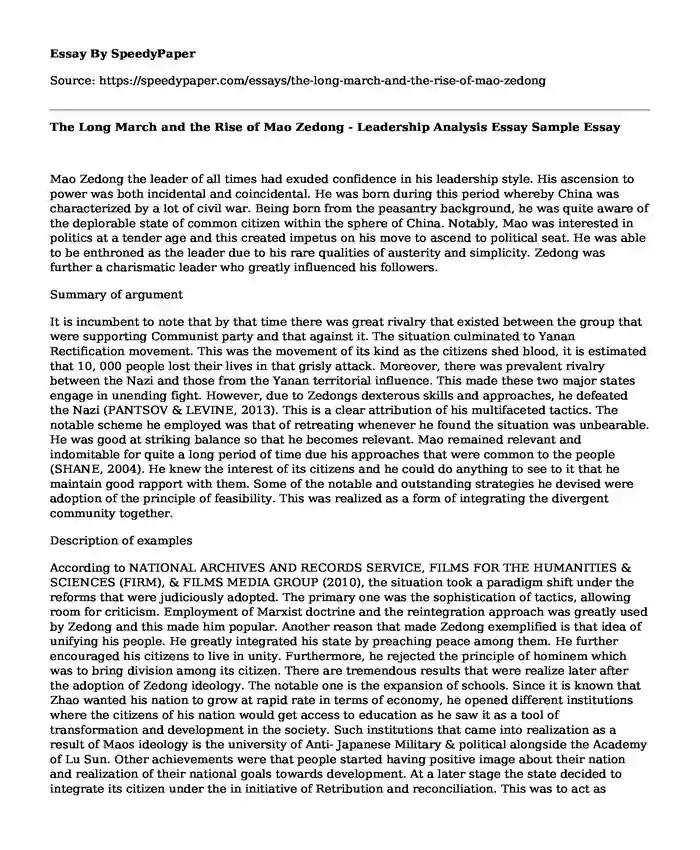
| Type of paper: | Essay |
| Categories: | Leadership analysis Personality |
| Pages: | 3 |
| Wordcount: | 645 words |
Mao Zedong the leader of all times had exuded confidence in his leadership style. His ascension to power was both incidental and coincidental. He was born during this period whereby China was characterized by a lot of civil war. Being born from the peasantry background, he was quite aware of the deplorable state of common citizen within the sphere of China. Notably, Mao was interested in politics at a tender age and this created impetus on his move to ascend to political seat. He was able to be enthroned as the leader due to his rare qualities of austerity and simplicity. Zedong was further a charismatic leader who greatly influenced his followers.
Summary of argument
It is incumbent to note that by that time there was great rivalry that existed between the group that were supporting Communist party and that against it. The situation culminated to Yanan Rectification movement. This was the movement of its kind as the citizens shed blood, it is estimated that 10, 000 people lost their lives in that grisly attack. Moreover, there was prevalent rivalry between the Nazi and those from the Yanan territorial influence. This made these two major states engage in unending fight. However, due to Zedongs dexterous skills and approaches, he defeated the Nazi (PANTSOV & LEVINE, 2013). This is a clear attribution of his multifaceted tactics. The notable scheme he employed was that of retreating whenever he found the situation was unbearable. He was good at striking balance so that he becomes relevant. Mao remained relevant and indomitable for quite a long period of time due his approaches that were common to the people (SHANE, 2004). He knew the interest of its citizens and he could do anything to see to it that he maintain good rapport with them. Some of the notable and outstanding strategies he devised were adoption of the principle of feasibility. This was realized as a form of integrating the divergent community together.
Description of examples
According to NATIONAL ARCHIVES AND RECORDS SERVICE, FILMS FOR THE HUMANITIES & SCIENCES (FIRM), & FILMS MEDIA GROUP (2010), the situation took a paradigm shift under the reforms that were judiciously adopted. The primary one was the sophistication of tactics, allowing room for criticism. Employment of Marxist doctrine and the reintegration approach was greatly used by Zedong and this made him popular. Another reason that made Zedong exemplified is that idea of unifying his people. He greatly integrated his state by preaching peace among them. He further encouraged his citizens to live in unity. Furthermore, he rejected the principle of hominem which was to bring division among its citizen. There are tremendous results that were realize later after the adoption of Zedong ideology. The notable one is the expansion of schools. Since it is known that Zhao wanted his nation to grow at rapid rate in terms of economy, he opened different institutions where the citizens of his nation would get access to education as he saw it as a tool of transformation and development in the society. Such institutions that came into realization as a result of Maos ideology is the university of Anti- Japanese Military & political alongside the Academy of Lu Sun. Other achievements were that people started having positive image about their nation and realization of their national goals towards development. At a later stage the state decided to integrate its citizen under the in initiative of Retribution and reconciliation. This was to act as unifying agents such that the major countries that were involved in the Civil war.
BIBLIOGRAPHY
NATIONAL ARCHIVES AND RECORDS SERVICE, FILMS FOR THE HUMANITIES & SCIENCES (FIRM), & FILMS MEDIA GROUP. (2010). Mao Tse-Tung, 1969. New York, N.Y., Films Media Group. http://digital.films.com/PortalPlaylists.aspx?aid=13753&xtid=48829.
PANTSOV, A., & LEVINE, S. I. (2013). Mao: the real story.
SHANE, C. J. (2004). Mao Zedong. San Diego, Greenhaven Press.
th ed.
Cite this page
The Long March and the Rise of Mao Zedong - Leadership Analysis Essay Sample. (2019, Sep 20). Retrieved from https://speedypaper.com/essays/the-long-march-and-the-rise-of-mao-zedong
Request Removal
If you are the original author of this essay and no longer wish to have it published on the SpeedyPaper website, please click below to request its removal:
- Free Paper Example: Strategy Matrix in Healthcare
- Free Essay on Philosophers: Ralph Waldo Emerson vs. Cornell West
- Eating Meat Essay Sample
- Pilates Exercise Feet in Straps on the Reformer. Free Essay Example.
- Seeking Love: Patterns in Ads 1-8
- Essay Sample on Psychopathy in Abnormal Psychology
- Become a Clergy - Free Paper Example
Popular categories




